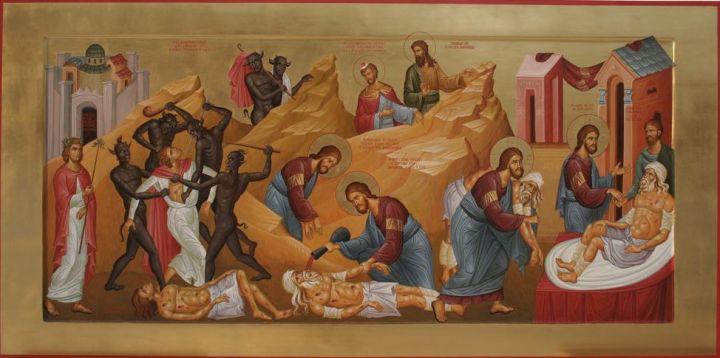We all love having someone to blame: foreigners, immigrants, economic migrants, politicians, especially politicians, they’re particularly good! There is something about the human condition which makes us love having someone to blame other than ourselves. Someone to point the finger at, as long as it is not US! The Ancient Jews were no different. And generally speaking they blamed the Samaritans. They hadn’t gone into exile to Babylon, they’d stayed and intermarried. They weren’t pure, and they worshipped in the wrong place: on Mt Gerazim, rather than Mt Zion, Jerusalem.
So in this morning’s Gospel a lawyer stands up and tries to test Jesus. The lawyer understands the law of Moses, and quotes from Deuteronomy and Leviticus to get to the heart of the matter, loving God, and loving your neighbour. Quite simple and straightforward.
But that’s not enough for our legal friend. He’s competitive. He wants to win this encounter with a Galilean rabbi. So, he asks Jesus to define his terms. And so Our Lord tells him a story. The road which snaked its way down from Jerusalem was steep and windy. It was very easy for a single traveller to fall prey to robbers or bandits. The priest and the Levite, not knowing if the man is alive or not just pass by. They don’t want to risk becoming impure by touching a dead body. So a Samaritan, an outcast, someone the Jews loved to hate, stops, has pity on him, and saves his life. But he’s beyond the pale! It’s just not right! He’s been saved by an outcast, someone who isn’t ‘one of us’. The Samaritan doesn’t care. He simply sees someone in need, and helps them. That’s all! He demonstrates love and care. And that’s what matters.
God is a God of Love and Grace, generous in ways which we can never fully understand. Ours is a God who gives His Only Son to die the death of a common criminal, for love of us, to bear our sins, to heal our wounds, and heal the world of its brokenness. That’s how much God loves us, and longs to see us healed. That’s why the Sacrifice of Calvary will be represented here, this morning, so that we can be fed with the Body and Blood of Christ, to heal us, and transform us, so that we might become what Christ is. On the Cross, Christ becomes the outcast to save us, to make us free form the power of sin and death. He binds up our wounds, not pouring on oil and wine, but His own Blood to heal us. He saves us from the brigands of sin and death, so that we might know God’s love and grace, and our lives might be transformed.
This happens in the Church: here is the place of transformation, the place of healing, where we experience the grace of God in the Sacraments. The Word is very near to us here, the Word made flesh who reconciles humanity to God, making peace by the blood of His Cross. We are transformed by Christ and into Christ, so that we too may ‘go and do likewise’ and be agents of God’s love and grace in the world, to transform our communities, and all the world. To fill it with God’s love and compassion. It’s a radical vision, and a work in progress: loving, forgiving, healing, reconciling. And it’s what the Kingdom of God looks like in reality — lived out in people’s lives. It’s what Jesus tells the lawyer to do: ‘Go and do likewise.’
Is it easy? By no means! Do we all have to do it? Yes! And we have to support each other as we do it. It’s a communal effort, for the entire baptised people of God, across space and time. In Christ, God’s grace has been poured out upon us, costly, self-giving love, which we accept when we repent and turn away from sin, and turn back to God, acknowledging our failures and weaknesses, and asking God to transform us. This leads us ti become more generous, loving, and forgiving of others (and ourselves), thankful people, who are generous, who ‘go and do likewise’ and that’s the HARD bit, actually doing it. It’s easy to talk about doing it. Doing it is difficult and costly, and that’s the point. It’s why we need a community, nourished by Word and Sacrament to support us as we try to do it together. Helping us to shoulder the burden, and picking us up when we fall. It’s supposed to be a communal thing, so that we help each other become saints. This is the Christian vision of the world. It looks radical. It isn’t selfish, or obsessed with power or wealth. The Church doesn’t look like this. But that’s ok, because we can transform both the Church and the World, so that they look the way God wants them to look: filled with loving and generous people who are, by God’s grace, making the Kingdom of God a reality here and now. Preparing us all for the joy of heaven, and inviting others to share in that joy so that all people may sing the praises of to God the Father, God the Son, and God the Holy Spirit, to whom be ascribed as is most right and just all might, majesty, glory, dominion, and power, now and forever. Amen

No comments:
Post a Comment